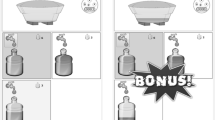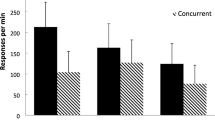Abstract
The effect of disparities in reinforcement frequency on human free-operant cooperative responding was examined. Points exchangeable for money maintained responding. Two schedule components alternated during a session. A random interval (Rl) 60-s schedule of point additions was in effect during the first component and a concurrent RI 60-s RI 60-s schedule was in effect during the second component. Subjects were instructed that the second component was initiated by another subject and that they had the option of earning points by working with, or independently of, the other subject. Independent responses earned points added to a counter marked “YOUR EARNINGS.” Cooperative responses earned points added simultaneously to a counter marked “YOUR EARNINGS” and “OTHERS EARNINGS.” Disparities of reinforcement were produced during the first component by increasing the frequency of point additions to either the subject’s or the fictitious other person’s counter. Disparities benefiting the fictitious other subject reduced cooperative responding, decreased independent responding, and had no effect on nonsocial responding during the first component. Disparities benefiting the subject increased cooperative responding in one subject.
Similar content being viewed by others
References
ADAMS, J. S. (1965). Inequity in social exchange. In L. Berkowitz (Ed.), Advances in experimental social psychology (Vol. 2, pp. 267–299). New York: Academic Press.
BLAU, P. M. (1964). Exchange and power in social life. New York: John Wiley & Sons.
CHEREK, D. R., SPIGA, R., BENNETT, R. H., & GRABOWSKI, J. (1991). Human aggressive and escape responding: Effects of provocation frequency. The Psychological Record, 41, 3–17.
CHEREK, D. R., SPIGA, R., STEINBERG, J. L, & KELLY, T. H. (1990). Human aggressive responses maintained by avoidance or escape from point loss. Journal of the Experimental Analysis of Behavior, 53, 293–303.
DEUTSCH, M. (1973). The resolution of conflict. New Haven: Yale University Press.
HAKE, D. E, & OLVERA, D. F. (1978). Cooperation, competition and related social phenomena. In A. C. Catania & T. A. Brigham (Eds.), Handbook of applied behavior analysis (pp. 208–245). New York: Irvington.
HAKE, D. F., & SCHMID, T. L. (1981). Acquisition and maintenance of trusting behavior. Journal of the Experimental Analysis of Behavior, 35, 109–124.
HAKE, D. E, & VUKELICH, R. (1972). A classification and review of cooperation procedures. Journal of the Experimental Analysis of Behavior, 18, 333–343.
HAKE, D. E, VUKELICH, R., & OLVERA, D. (1975). The measurement of sharing and cooperation as equity effects and some relationships between them. Journal of the Experimental Analysis of Behavior, 23, 63–80.
HOMANS, G. C. (1961). Social behavior: Its elementary forms. New York: Harcourt Brace & World.
MATTHEWS, B. (1977). Magnitudes of score differences produced within sessions in a cooperative exchange procedure. Journal of the Experimental Analysis of Behavior, 27, 331–341.
MARWELL, G., & SCHMITT, D. R. (1975). Cooperation: An experimental analysis. New York: Academic Press.
MARWELL, G., RATCLIFF, K., & SCHMITT, D. R. (1969). Minimizing differences in a maximizing difference game. Journal of Personality and Social Psychology, 12, 158–163.
RADINSKY, T. L. (1969). Equity and inequity as a source of reward and punishment. Psychonomic Science, 15, 293–295.
SCHMID, T. L., & HAKE, D. F. (1983). Fast acquisition of cooperation and trust: A two stage view of trusting behavior. Journal of the Experimental Analysis of Behavior, 40, 179–192.
SCHMITT, D. R. (1987). Interpersonal contingencies: Performance differences and cost effectiveness. Journal of Experimental Analysis of Behavior, 48, 221–234.
SCHMITT, D. R., & MARWELL, G. (1972). Withdrawal and reward reallocation as responses to inequity. Journal of Experimental and Social Psychology, 8, 207–221.
SEIDEN, L. S., & DYKSTRA, L. A. (1977). Psychopharmacology: A biochemical and behavioral approach. New York: Van Nostrand Rheinhold Co.
STITZER, M. L., McCAUL, M. E., BIGELOW, G. E., & LIEBSON, I. A. (1984). Social stimulus factors in drug effects in human subjects. In T. Thompson & C. E. Johanson (Eds.), Behavioral pharmacology of drug dependence. (Dhhs Publication No. Adm 81-1137, pp. 30–154). Washington, DC: Government Printing Office.
THOMPSON, T., & SCHUSTER, C. R. (1968). Behavioral pharmacology. Englewood Cliffs: Prentice Hall.
WEINER, H. (1969). Conditioning history and the control of human avoidance and escape responding. Journal of the Experimental Analysis of Behavior, 12, 1039–1044.
WEINER, H. (1977). An operant analysis of human altruistic responding. Journal of the Experimental Analysis of Behavior, 27, 515–528.
Author information
Authors and Affiliations
Additional information
This research was supported by Grants DA03166 (D. R. Cherek, principal investigator) and DA06633 (Ralph Spiga, principal investigator) from the National Institute on Drug Abuse. Ralph Spiga was also supported by Post-doctoral Fellowship DA05369 from the National Institute on Drug Abuse during this period. We thank Lori Zunker for her special assistance and reviewers for their helpful comments.
Rights and permissions
About this article
Cite this article
Spiga, R., Cherek, D.R., Grabowski, J. et al. Effects of Inequity on Human Free-Operant Cooperative Responding: A Validation Study. Psychol Rec 42, 29–40 (1992). https://doi.org/10.1007/BF03399585
Published:
Issue Date:
DOI: https://doi.org/10.1007/BF03399585




